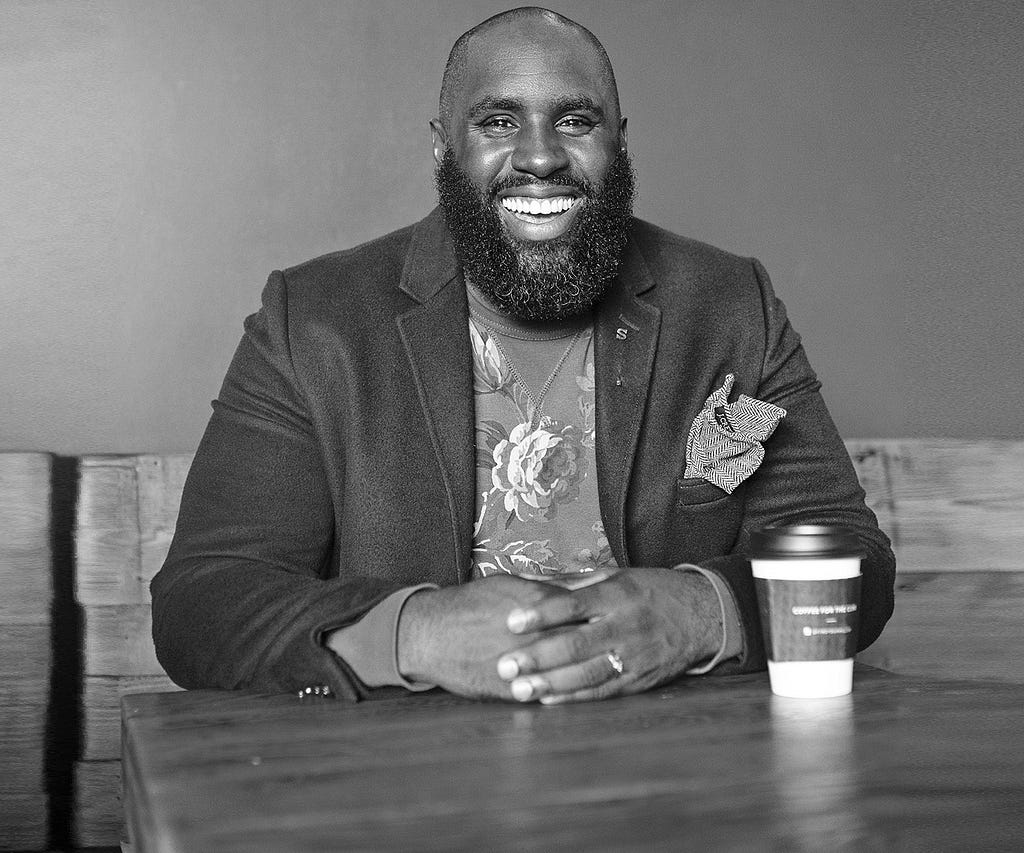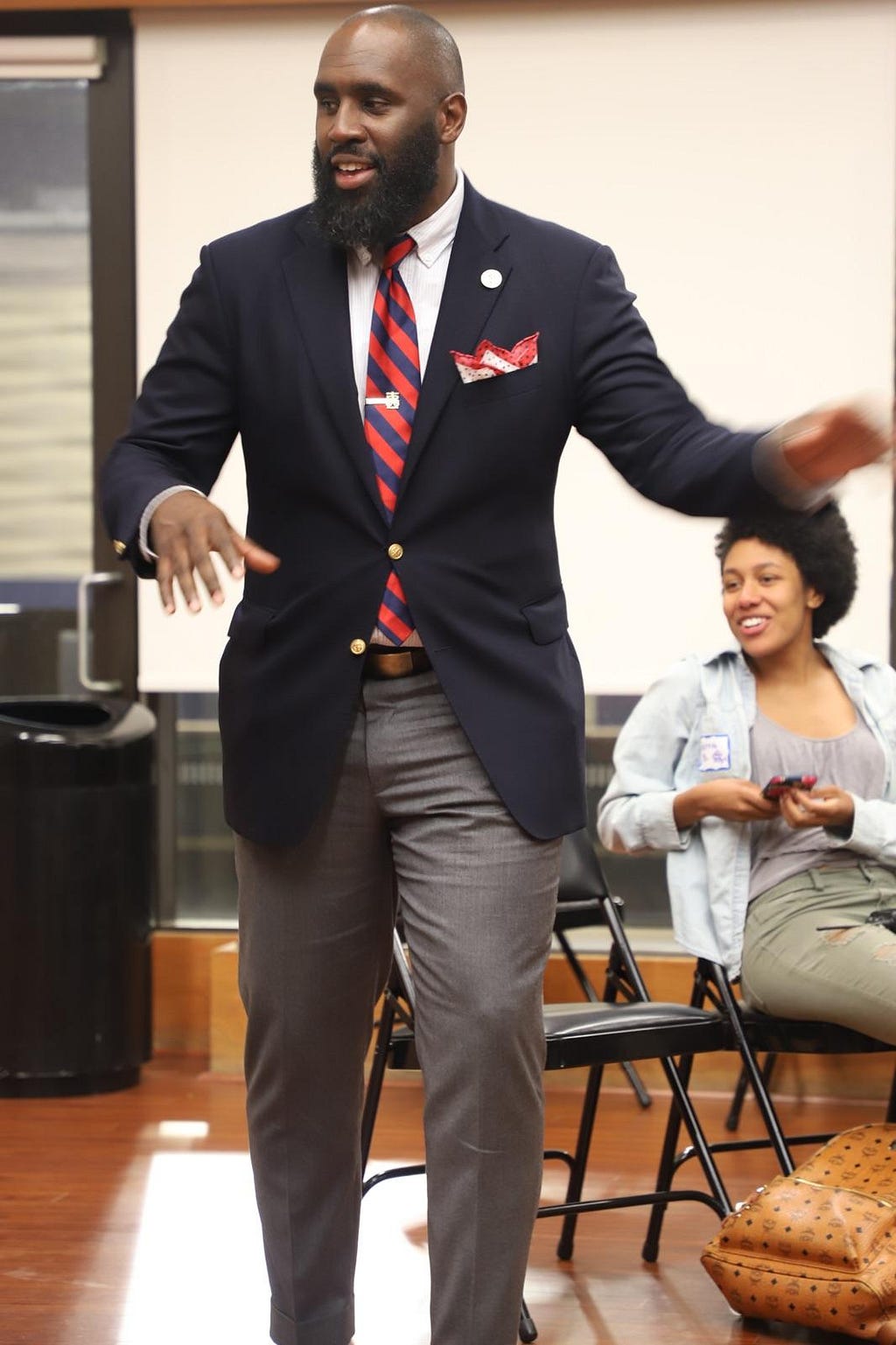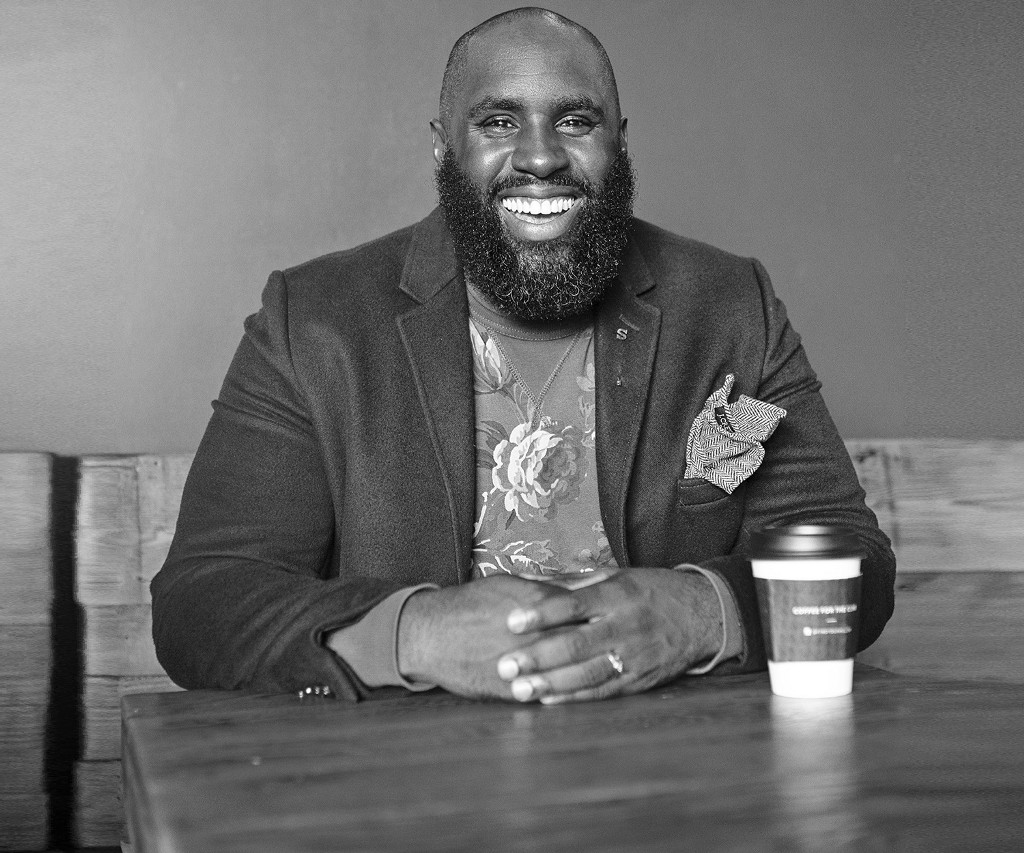“How I Was Able To Thrive Despite First Experiencing Impostor Syndrome” With Marriage & Family Therapist Stevon Lewis

Be relentless in challenging their “Inner Bully”. The inner bully is that inner voice we all have that makes us question our abilities and self-worth. Listening to it often leads us to feel more negatively about ourselves, our futures, and our present circumstances. For example, in a relationship an inner bully might prey on our thoughts of feeling as though we don’t deserve our significant other. Often times this will cause us to act in ways that prevent intimacy and connection. We become increasingly angry, clingy, jealous, defensive, or easily offended. If our partners are less talkative on a particular day, our inner bullies get us to believe they are mad at us for something we did. We will blindly believe our inner bully instead of checking in to see if our significant other may not feel good or if there is some other rational explanation for their silence.
As a part of our series about how very accomplished leaders were able to succeed despite experiencing Imposter Syndrome, I had the pleasure of interviewing Stevon Lewis. Stevon is a licensed Marriage and Family Therapist. He earned Bachelors of Arts degrees in Psychology and Afro-Ethnic Studies from California State University, Fullerton. He also has a Master’s of Science degree in Counseling with an emphasis in Marriage and Family Therapy from California State University, Long Beach. Stevon began his therapy career in 2007 as a therapist at a community mental health agency in Long Beach working with the families of adolescents involved with the juvenile justice system. More recently, he served as the Director of Counseling Services at Woodbury University, a small private university in Burbank, CA. Currently, he is in private practice full-time, in Torrance, where he works with adults struggling with Impostor Syndrome, and couples experiencing difficulty in their relationships as a result of poor communication and unmet expectations. In addition, he is an Adjunct Professor at Pepperdine University and a Past President of the Long Beach-South Bay Chapter of the California Association of Marriage and Family Therapists.
Thank you so much for joining us Stevon! Our readers would love to “get to know you” a bit better. Can you tell us a bit about your ‘backstory’?
I was born and raised in South Central LA. As a kid, I was part of the CHOICES program which allowed inner-city kids to attend schools outside of their area. My mom sent me to Wonderland Avenue Gifted Magnet Elementary in the Hollywood hills. It was a bit of culture shock for sure; I mean I’m a kid from the hood, and some of these guys’ parents were producers for Beverly Hills 90210 and writers for Cheers.
I can remember back as young as 5th grade always being interested in why people did the things they did. A vivid memory I have, is of a kid who was new to Wonderland. He was an African-American kid, which there weren’t many of us there, and he was getting into trouble, like being brought to school by the police trouble. This wasn’t something that was common for students at Wonderland. I was always curious about how he ended up at our school because he definitely didn’t fit in. One day he rode my bus home, not sure why, but he was picked up by an older White woman, old enough to be his grandmother. I figured he must have been in foster care or something and that his situation probably had something to do with his behavior.
My fascination with people never left. I’ve always had an ability to connect with people on an emotionally intimate level and remember being the guy that talked my friends down when they were upset, facilitated “mediation” between friends, or redirected negative behavior. It was a natural progression for me to end up as a psychotherapist. I would talk to people and connect with people even if I weren’t a therapist. After high school I took some time off from school, a year, to process as best I could, the death of my father. I took some classes at Santa Monica Community College and eventually transferred to CSU, Fullerton. After undergrad, I worked in group homes and non-public schools before enrolling in my Master’s program at CSU, Long Beach. My first job as a Trainee was at a community mental health agency in South Central LA working with the families of kids involved in the juvenile justice system. I stayed at that agency for seven years working my way up to Program Manager.
I moved on to become the Director of Counseling Services at Woodbury University, a small private college in Burbank, CA. I served as Director for 5 years and am now full-time in my private practice, in Torrance, CA.
Can you share with us the most interesting story from your career? Can you tell us what lessons or ‘take aways’ you learned from that?
Early in my career, while working in community mental health, I was a field therapist. That means that I would conduct therapy in my clients’ homes. Most of my clients were in South Central Los Angeles, and predominantly Black and Latino areas. I once received a referral for a family and called as I normally did to set up an appointment. The guardian of my potential client answered the phone and asked me a question I was unprepared for. They asked me if I was Black. After I acknowledged that I was they quickly indicated that I could not schedule an appointment. I had to have my supervisor at the time, a White male, to contact the family and convince them to allow me to accompany him as he met with the family. When we met with the family it turned out they were also Black, and that my potential client had been sexually assaulted on multiple occasions by Black men. This made their guardian extremely leery of Black men in general. From this experience I learned an important lesson. That is, because I may share some similarities with a potential client, I cannot allow those similarities to prevent me from doing the work to establish a rapport and getting to know their personal stories.
What do you think makes your company stand out? Can you share a story?
As a therapist I stand out because I am a Black male. In the field of psychotherapy there aren’t many Black males. Clients often want someone that looks like them when they come to therapy. Their belief is that some things about them will not have to be explained. While this isn’t necessarily true, this belief often drives the choice in therapist for African-American clients. I’ve had many clients, Black males, that came to me as their first time ever participating in therapy. One had such a good experience that they encouraged their family member to come as well. I choose to see that as a testament to the good work we did and some change to the negative narrative that surrounds mental health services in the Black community.
None of us are able to achieve success without some help along the way. Is there a particular person who you are grateful towards who helped get you to where you are? Can you share a story?
I’ve had several people help me along my journey and am grateful for all that they have done to assist in my maturation as a therapist. Someone that I’ve continued to lean on and seek guidance from, as my career grows, is Dr. Thema Bryant-Davis. She is a psychologist in the L.A. area and is my “go to” when I need to process career related decisions. She has helped me navigate my first few interactions with producers that wanted to meet with me about possible TV appearances.
Ok thank you for all that. Now let’s shift to the main focus of this interview. We would like to explore and flesh out the experience of Impostor Syndrome. How would you define Impostor Syndrome? What do people with Imposter Syndrome feel?
Impostor Phenomenon is a term coined by Dr. Pauline Clance and is more commonly known as Impostor Syndrome. Individuals that suffer from Impostor Syndrome are usually high achievers in some facet of their life, whether it be in their career, in education, or in the arts. What I have found in working with individuals that struggle with impostorism, is that that they don’t come to therapy indicating feeling like an impostor as their primary presenting problem. Most often they’ll express feelings of not living to their full potential or report a history of self-sabotaging their success. In addition, while Impostor Syndrome isn’t in the Diagnostic and Statistical Manual of Mental Disorders Fifth Edition (DSM-5), the symptoms usually develop into depression or anxiety, disorders that are diagnosable.
In peeling back the layers I’ve found some glaring commonalities:
· They had a parent(s) that was very critical of them; frequently pointing out where they needed improvement.
· Their parent(s) did not equally provide praise of their accomplishments or achievements, and often dismissed those accolades as routine or required.
· They are often the product of a childhood environment that was dysfunctional, in which they seem to be the only person from their immediate family to have experienced the overall success they have achieved.
· Expressions of love were infrequent or nonexistent.
· As adults they seem to be the “only one” in the room, as in the only person of color or only woman.
· As a result of these experiences they have developed a high level of self-doubt, are dismissive of their own abilities, are overly critical of themselves, neglectful of their needs, and fearful of future failure. For example, someone struggling with Impostor Syndrome might receive an award and say, “Oh, almost everyone got one,” or after getting an ‘A’ in a class, they might respond, “That class was easy!” Other times they may be plagued with intense fear that they are going to “screw things up” as a result of getting a promotion, becoming a parent, approaching marriage, or some other potential increase in responsibility.

What are the downsides of Impostor Syndrome? How can it limit people?
The downsides are that individuals that struggle with Impostor Syndrome often end up with high levels of anxiety or depression. They live in constant fear of being found out as a fraud due to their continued success. They are unable to connect with their successes and often find elaborate ways to explain away their success, and when they are unable to explain away their success, they will often turn to minimizing the significance of that achievement. That is, they will say that their accomplishment wasn’t that difficult or that if anyone wanted to do what they did, they could have. In addition, Impostor Syndrome often causes people to refrain from seeking out greater opportunities due to their strong belief that they don’t have what it takes to have earned said success.
How can the experience of Impostor Syndrome impact how one treats others?
People with Impostor Syndrome are often times the biggest cheerleaders for the accomplishments of others. They are extremely happy for the success of close friends and family. Impostor Syndrome causes people to inflate the deservedness of others. That is, it’s easy for them to see why other people deserve the success they have attained. The pitfall is that this narrative they create about the abilities and deservedness of others leads them to further negatively evaluate their own abilities and accomplishments.
We would love to hear your story about your experience with Impostor Syndrome. Would you be able to share that with us?
As a Black male therapist, I haven’t always had an example, per se, to follow or model myself after. In my graduate program I was the only Black male in my program the entire time I was there. I think this experience led to me questioning whether or not I knew what I was doing. I don’t have an example to follow to effectively evaluate my trajectory and therefore, enter into most opportunities questioning if I will be successful.
Did you ever shake the feeling off? If yes, what have you done to mitigate it or eliminate it?
I continually overcome any feelings of impostorism. I use the same techniques and skills I teach my clients. I tell myself, when exploring a new opportunity, that I’ve been successful in the past and find ways to figure out how to be successful and would continue to do so in whatever the new venture is. In addition, I tell myself I am doing a good job and remind myself of all the evidence around me that supports this belief.
In your opinion, what are 5 steps that someone who is experiencing Impostor Syndrome can take to move forward despite feeling like an “Impostor”? Please share a story or an example for each.
Five steps someone with Impostor Syndrome can take to thrive despite their impostorism are to:
1. Be relentless in challenging their “Inner Bully”
· The inner bully is that inner voice we all have that makes us question our abilities and self-worth. Listening to it often leads us to feel more negatively about ourselves, our futures, and our present circumstances. For example, in a relationship an inner bully might prey on our thoughts of feeling as though we don’t deserve our significant other. Often times this will cause us to act in ways that prevent intimacy and connection. We become increasingly angry, clingy, jealous, defensive, or easily offended. If our partners are less talkative on a particular day, our inner bullies get us to believe they are mad at us for something we did. We will blindly believe our inner bully instead of checking in to see if our significant other may not feel good or if there is some other rational explanation for their silence.
2. Create an evidence sheet
· An evidence sheet as an actual piece of paper, or a digital notebook, where you list all of the evidence that doesn’t support your negative view of yourself as a fraud. This is not based on whether you agree with the information, as we know people that struggle with Impostor Syndrome will often explain away the evidence they receive that suggests they aren’t a fraud. The goal is to continually add to the document to show oneself that their feelings of being a fraud aren’t based in reality.
3. Stop dismissing or minimizing their accomplishments
· Individuals that struggle with Impostor Syndrome often dismiss, or minimize, their accomplishments as routine. I teach my clients to celebrate themselves by acknowledging their accomplishments. The idea is that even if their accomplishment is routine, that doesn’t that it shouldn’t be acknowledged. In addition, if we disproportionately highlight our shortfalls, while ignoring our successes we end up feeling like a failure.
4. Temper their expectations of themselves
· People that struggle with Impostor Syndrome frequently hold themselves to a standard of perfection that isn’t sustainable or achievable. Unless they are perfect, they are convinced they are failing. It would be better for them to temper expectations by using scaling techniques to evaluate their performance. For example, if they have a list of 10 things to accomplish and they accomplish 9 out of 10, it would be better to say they’ve accomplished 90% of what they wanted to do and remind themselves that 90% is an A!
5. Stop comparing themselves to others!!!
· In working with individuals that struggle with Impostor Syndrome, the most toxic behavior they exhibit is using the lives and accomplishments of others to negatively evaluate themselves. I often hear, from my clients, how others are superior in their abilities and, as a result, are more deserving of the success they have achieved. Individuals with Impostor Syndrome need to stop measuring their abilities and journey based on someone else’s model. It’s okay to take a different route to get to the same location; some people like to fly, while others would rather drive.
You are a person of great influence. If you could inspire a movement that would bring the most amount of good to the greatest amount of people, what would that be? You never know what your idea can trigger. :-).
I have an idea that I want to start with children of color from less advantaged environments. I think that access to resources and appropriate guidance are two major components, within our control, that holds them back from achieving more. That being said, I would love to start an organization that sought to identify elementary school aged children and give them access to resources and guidance through college. The idea would be to get them enrolled in the best elementary schools, best middle schools, best high schools, and best colleges to give them a chance at long-term success.
We are blessed that some very prominent leaders read this column. Is there a person in the world, or in the US, with whom you would love to have a private breakfast or lunch, and why? He or she might just see this, especially if we tag them :-).
I’ve always said, jokingly, that if I met Oprah my life would be changed for the better. She’s such a great cheerleader of people that if she believes in you, you, in turn, will believe you can do anything. Additionally, I am a HUGE fan of Malcolm Gladwell’s work and would love to have a conversation with him. I am fascinated by how he thinks and would be excited to discuss politics with him. I listen to his podcast religiously and have read most of his books; still working on What the Dog Saw and Talking to Strangers at the time of this interview. He’s a consumer of knowledge and I see myself as having a similar thirst for understanding things.
How can our readers follow you on social media?
I am most active on my Instagram and LinkedIn accounts, but for the purposes of this article I will list all of my social media handles
· Instagram — @StevonLewisMFT
· Twitter — @StevonLewisMFT
· LinkedIn — https://www.linkedin.com/in/stevonlewis/
· Facebook — @StevonLewisLMFT
This was very inspiring. Thank you so much for joining us!
“How I Was Able To Thrive Despite First Experiencing Impostor Syndrome” With Marriage… was originally published in Authority Magazine on Medium, where people are continuing the conversation by highlighting and responding to this story.




